IRES End of Year Reflections
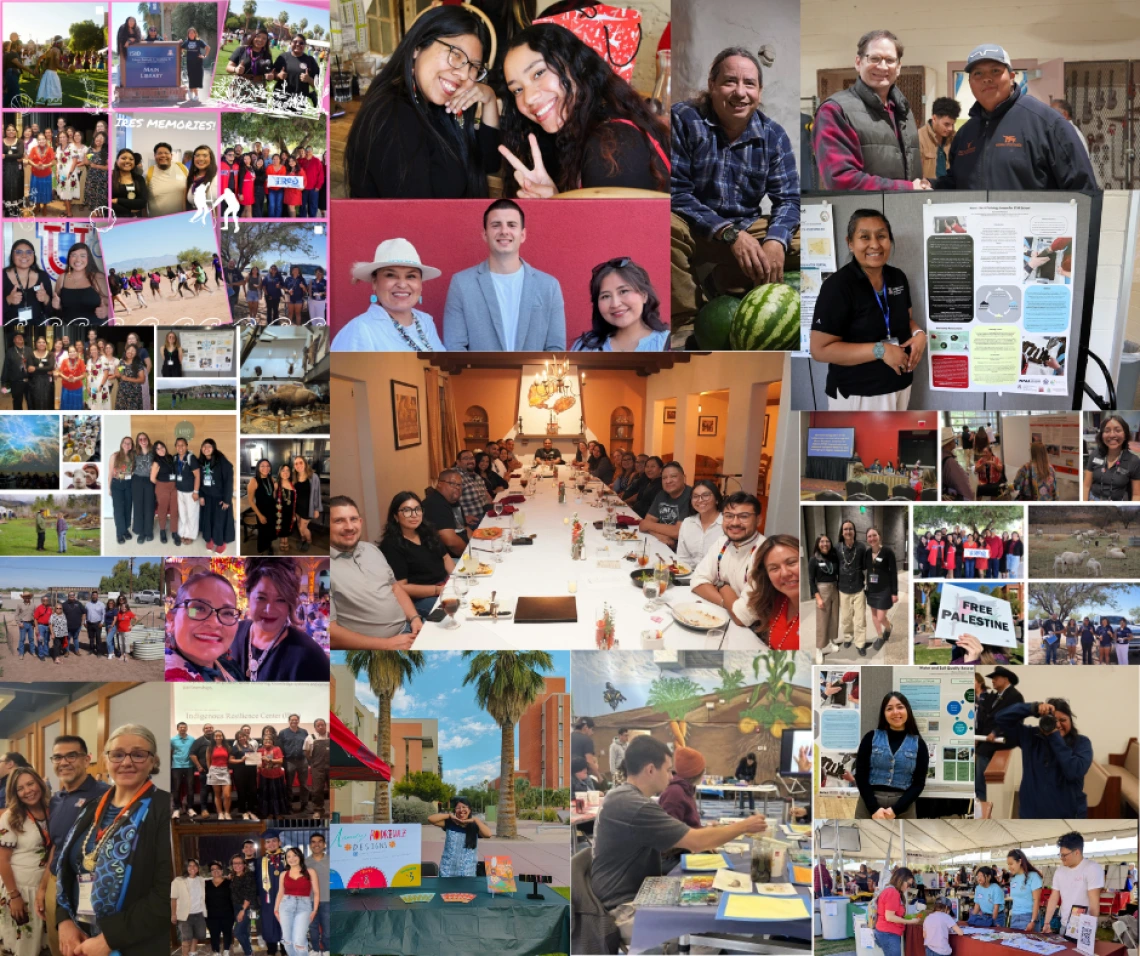
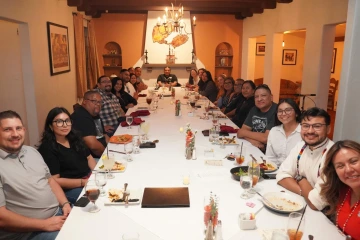
Daniel Sestiaga Jr. (Assistant Director)~ This year has been full of ups and downs. I would be remiss not to acknowledge the rollercoaster our team has experienced—from celebrating the grand opening of the Center in September and preparing for a full blessing of our space, to the dramatic turn of losing federal funding that shaped our April and May.
It’s been seasons of challenges and growth, but through it all, IRes persists. We are fortunate to have a resilient team of individuals committed to our communities, advocacy, teaching, capacity building, and, of course, research.
This past spring semester, we grounded ourselves in community. Time and again, we turned to our partners for guidance, support, and encouragement. They have given us so much—more than words can express. Personally, their words of encouragement have stayed with me: “Keep up the good work. Don’t forget why and how we are invested in this environmental work.”
Moments like the one pictured—casual meetings over food, heartfelt conversations, laughter, tears, and mutual uplift—have nourished my spirit. There are incredible people out there doing thankless work simply because they care. They are invested. And it’s these folx who keep us grounded, moving forward, and rooted in our purpose. In all, it has been a good and fast paced year- much growth (teetering here and there) but overall steady and meaningful. Wishing you all a great summer, one that allows you to connect with family, friends and allows you to recharge.
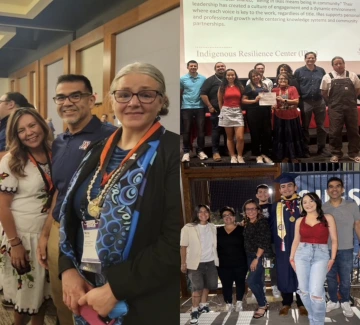
Bernice Rodriguez (Program Coordinator) ~As we close out another inspiring and eventful academic year, I find myself reflecting on the incredible journey we’ve taken together at IRes. Serving as the Program Coordinator has been a rewarding experience, one that continues to shape my growth and keeps me focused on uplifting and supporting our communities with respect and purpose. This past year brought moments of recognition and celebration. We officially held the grand opening of our IRes space, an achievement made possible by the dedication of our team and support from our campus and community partners. One of the most meaningful moments this year was being named a Sequoyah Fellow during the 2024 National AISES Conference, an honor that reflects a deep commitment to Indigenous excellence and leadership. I was equally excited to see our team recognized with the University of Arizona’s 2025 Excellence Award, a reflection of the integrity, collaboration and cultural grounding that is at the core of our work. On a personal note, it was incredibly special to watch my eldest son walk in his second commencement ceremony as a Master’s student in Microbiology. Witnessing his journey and success has filled our family with pride and gratitude.
Here’s to making the next academic year filled with renewed energy and a commitment to a future where Native knowledge, resilience and leadership continue to be uplifted.
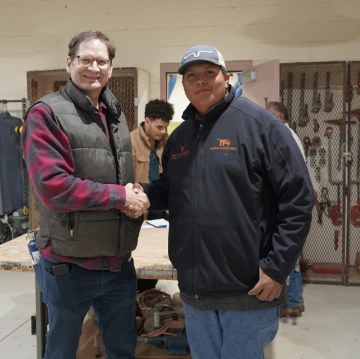
Torran Anderson (Community Outreach Manager)~ It has been a time of great change. Over the past year, we’ve experienced incredible growth and faced funding challenges, including the termination of federal grants. We needed to turn to our own resilience and the community that grounds our work. Thank you to the ongoing supporters who believe in the mission of IRes, like the Agnese Nelms Haury Program, the Waverley Street Foundation, and the Arizona Institute for Resilience (AIR).
There have been weekly events, meetings, and Zoom calls. Some of the highlights have included:
- Joining the CRIT Food Distribution Program Garden Opening Day.
- Collaborating with Baboquivari HS, TOCC for an Agricultural Day. Sharing a meal prepared by the Tohono O’odham Community College (TOCC) Tohono Kosin Desert Kitchen Program.
- Meeting with partners at San Carlos Apache and seeing the Nalwoodi Denzhone Community Farm (NDC).
- Presenting the work of IRes to the Pascua Yaqui Tribal Council.
- Participating in what we didn’t know would be the last Native FEWS Annual Gathering in Montana and meeting in person with our partners.
- The thoughtful sessions at the Tribal Environmental Health Forum, RTOC, SACNAS, and AISES.
- The Indigenous Correspondents Program (ICP) “Centering Communities” panel at the Planet Forward Summit
- Meeting leaders of environmental work at the Braiding Knowledges Symposium and hearing Xiuhtezcatl present about his journey as a young environmental advocate.
- Celebrating the IRes Grand Opening
We look forward to another year and more opportunities to work with the community. Thank you to the IRes faculty, staff, and students who have pulled together during these challenging times. I am grateful for the campus and community partnerships that have supported and inspired our work.
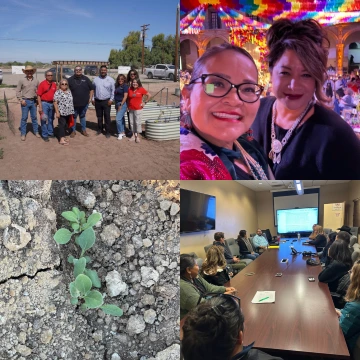
Tina Gargus (Grant & Project Coordinator)~ As I reflect on my first year with the Indigenous Resilience Center, I am filled with deep gratitude for the relationships, learning opportunities, and shared purpose that have shaped my role within this amazing team. I joined the IRes team in July 2025, stepping into a space committed to values that lift Indigenous knowledge, environmental stewardship, and community resilience.
One of the most rewarding aspects of my role has been the opportunity to travel and connect with Indigenous people and tribal communities. From Mexico City to Alaska, Hopi, CRIT, Ak-Chin, Pascua Yaqui, and San Carlos, each visit offered the chance to learn and build relationships. These experiences reminded me that our work is about people, place and reciprocity.
A major achievement this year was working with the Tishman Environment and Design Center to co-convene the Centering Justice Symposium in March. This gathering brought together environmental justice advocates and Indigenous and community leaders from across the country, to engage in dialogue, share knowledge, and imagine just futures. Helping to organize this event reaffirmed my belief in the power of convening and collective visioning. Attending my first AISES Conference was another highlight, where I witnessed the brilliance and strength of Indigenous students, scientists, and professionals committed to shaping a better future.
The most important lesson I’ve learned has been the power of being in community— with colleagues, with collaborators, and with the communities we serve. In moments of both challenge and celebration, it is these relationships that sustain the work and give it meaning. I look forward to deepening these connections in the year ahead and continuing to support the vision and mission of IRes.

Katie Holtsoi (Senior Assistant to the Director)~ I am continually impressed and proud of the work that the IRes team performs within the communities we partner with and serve. Over the past academic year, I have been able to participate in these growing partnerships and network widely with leaders in tribal communities. Supporting Dr. Chief’s work has allowed me to gaze straight into a multi-faceted sphere of tribal resilience and community-led projects. I cannot emphasize how impressed I am when I learn of the ongoing work tribal members are engaging in and the projects they have established. One of my community visit highlights this year was with the San Carlos Apache tribe, specifically with the Nalwoodi Denzhone Community (NDC) Farm. NDC farm is a leading example in Indigenous people using their ingenuity, expertise, and resourcefulness to create something that will have a monumental impact on the cultural, social, and economic endeavors of San Carlos. Under A Student’s Journey Program last summer, we had two students work with our Center. One of our student interns, Millie Reede, is a member of the San Carlos Apache tribe. At the time we had met, her home community was facing hardship following the major fire that swept through the area. I recall having a conversation with Millie about the implications of tribal social safety nets that will support communities and address the holistic wellness of tribal members. A knowledge exchange like this would have never been possible without a partnership with A Student’s Journey program and community partners. I am proud of the work we do and the connections we have made over the past year. I’m looking forward to the new partnerships and ongoing collaborations with our tribal communities!
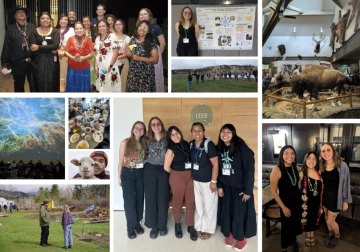
Ruth Pannill (Research Professional)~ The past year working with IRes has flown by, a seemingly non-stop marathon of events, meetings, conferences, and community building. Through it all, I've had the privilege of working with three incredible graduate students - Nieves Vazquez, LaCher Pacheco, and Majerle Lister - on projects ranging from science communication, to teacher resource development, to data analysis, and so much more. I have learned so much from these amazing people and scholars, including the rest of our IRes students. Collaborating with them, as well as witnessing them grow & bloom, has been a major highlight of my time at IRes.
I am very thankful for the numerous opportunities I have been given to travel to communities and conferences across Arizona and beyond. At what would end up being the final gathering of the Native FEWS Alliance in Missoula, MT, we were invited to spaces such as the CSKT (Confederated Salish & Kootenai Tribes) Bison Range & the Energy Keepers SKQ (Se̓liš Ksanka Qĺispe̓) Dam to experience & understand the power of tribal communities managing their own lands & systems. On campus, there have been many highlights including but not limited to hosting a keynote event with Xiuhtezcatl, an inspiring young environmentalist & artist, and all of the opportunities to Waila with the Tohono O'odham Student Association & Indigicats.
Every day, I am filled with gratitude for the opportunity to be part of the IRes community. Our work is rooted in relationship reciprocity, respect, and responsibility, and the community surrounding that work lives these values as well. Thank you to everyone that has been part of my journey to get to this moment!
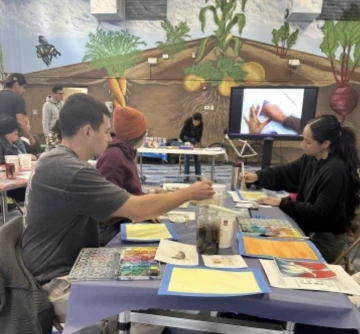
Jason Bruce (Postdoctoral Research Associate)~ My first six months at IRes have been an exciting and fulfilling journey, immersing me in impactful research and deep community connections. I hit the ground running with research on the longitudinal study at STAR School, contributing to its ongoing efforts. Presenting my experiences teaching in Indigenous community schools at the Native Voices in STEM (NVIS) event at the University of Arizona, co-sponsored by the Indigenous Teacher Education Program (ITEP), was a rewarding opportunity to share and connect. A major highlight was attending the Native FEWS Alliance 4th Annual Gathering in Missoula, Montana, where I visited the Confederated Salish and Kootenai Bison Range and the Energy Keepers SKQ Dam. The premiere of Bring Them Home at the conference was deeply moving, as I was inspired by the Blackfoot people’s dedication to restoring wild buffalo to their ancestral lands, a powerful story of cultural and ecological restoration.
*Photo by the Community School and Garden Program
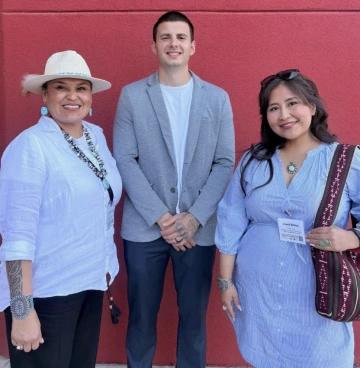
Bridging STEM, Environmental Health Science, and Indigenous Knowledge
Renee Tsinigine (Post Doctoral Research Scholar)~ My research centers on bridging STEM education and environmental health science with Indigenous cultural knowledge and research methodologies, with a deep commitment to community engagement, cultural continuity, and the co-creation of knowledge that respects and uplifts Indigenous Ways of Knowing.
Throughout my time with IRes, I have had the privilege of working alongside faculty mentors, allied staff, student mentees, and institutional collaborators across a vibrant network of academic and Tribal colleges and universities. These include AIHEC-affiliated colleges like Tohono O’odham Community College (TOCC) and Salish Kootenai College (SKC), as well as Northern Arizona University and the STAR School, UC Berkeley, the University of Colorado-Denver, Western Washington University, the University of Montana-Missoula, and the University of New Mexico’s Transformation Network. Each partnership has contributed to the ongoing effort to create safe, inclusive, and intellectually rigorous spaces for Indigenous research and education.
At IRes, we center Indigenous scholarship and community dialogue, which helped me to co-facilitate a book club on Research Is Ceremony by Shawn Wilson and coordinate the Native Voices in STEM Speaker Series. These experiences have sparked meaningful discussions and strengthened a sense of shared purpose and research among Indigenous scholars, students, and allies. Through this work, I continue to explore the critical intersections of Indigenous resilience, sustainability, and environmental health—fields that are fundamentally interconnected in Indigenous worldviews.
My research is informed by scholars such as Bang, Marin, & Medin (2018); Begaye (2017); Cajete (1994); Gone (2021); Kawagley (1990); Kimmerer (2013); Smith (2021); and Whyte (2018) who helped to shape my understanding of resilience not just as a response to adversity, but as a continuation of cultural responsibility, relationality, and reciprocal care for land and community. As we navigate scientific inquiry and education in the context of environmental health, I hold firm to the principle that we are all guests on Indigenous homelands—and with that comes a moral responsibility to respect, listen, and act in ways that sustain both people and planet.
As I continue this work, I remain committed to co-creating educational and research practices that are not only scientifically rigorous, but also culturally grounded and community led. IRes has provided a powerful foundation for this journey, and I am honored to contribute to its vision of Indigenous-led solutions for a resilient future.
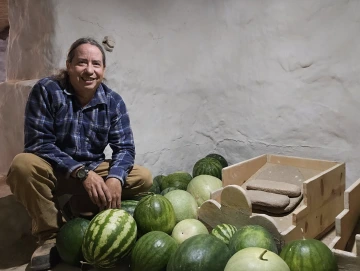
Michael Kotutwa Johnson (IRes Core Faculty)~ This year has been challenging in numerous ways. However, my role at the Indigenous Resiliency Center has been rewarding. I have made several new contacts, and all of my private foundation grants are designed to help lift our tribal communities here in Arizona and New Mexico. For example, I was able to use one my grants (Rockefeller Foundation) to develop an All Pueblo Agriculture Alliance (Pic) that includes my tribe (Hopi). We crafted a resolution at a May 2nd event in Santa Anna Pueblo in NM based on our values and experience as Pueblo farmers. The resolution will be circulated and signed by the 21 Pueblo tribes that make up the alliance. Another important aspect of my work is to explore ways to integrate traditional crops into the crops being grown on the reservations in southern Arizona. I would like this to happen because of the nutrient density of our crops and what they mean not only for the health of our communities but also for our cultural identity. Another aspect of my work involves collecting soil samples on reservations to ensure that tribal families and youth are not affected by the use of pesticides and herbicides used to grow crops such as alfalfa and cotton on tribal lands. I am concerned because those federal entities, such as the EPA, which are responsible for monitoring soils, have recently had their funding cut. The EPA, like other federal entities, has the responsibility over tribal nations in the United States. Ultimately, as I reflect on my work and the people I have met over the past year, I am left with a profound sense of hope. We must all find a way to hold on to hope. For me, it's simply the act of planting, rooted in my faith and the teachings of my grandfather. Our faith brings hope, and that, my friends, gets us through even the hardest of times.
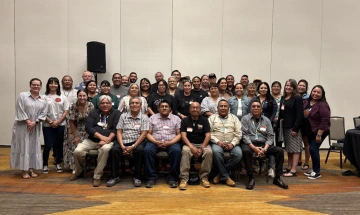
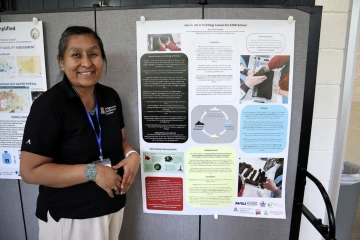
LaCher Pacheco (Graduate Assistant)~ The greatest gift a graduate student can receive is the opportunity for mentorship and collaboration. I write this reflection in first person. My name is LaCher Pacheco, I work for the University of Arizona’s Indigenous Resilience Center (IRes) as a graduate assistant (GA). Before I was an IRes GA, I was a Teaching, Learning and Sociocultural (TLS) doctoral student. I was mentored by a TLS doctoral student, Anthony Viola and he encouraged me to apply for the graduate assistant position with IRes. At the time, I was struggling with student teaching and being the only Pueblo Indian in TLS courses. I missed home and desperately needed a non-teaching job so I could focus on my coursework and writing. As a GA for IRes, I was able to focus on learning about theory and methodology.
I was able to apply what I was learning in my major to real life situations. In June 2023, Ruth Pannill (IRes Research Associate) and I began collaborating on a professional learning workshop for Native Food, Energy and Water (FEWS) educators. IRes offers anyone an opportunity to learn about FEWS by providing access to FEWS modules. I learned about FEWS topics and agrivoltaics. In my Pueblo community we follow the sun and solar panels follow the sun as well. Agrivoltaics and I follow the sun. In Algodones, New Mexico there are solar panels in the shape of sunflowers so I took this as a sign to grow and develop my skills as a doctoral researcher. I began researching picture books about climate change, solar energy and the environment. The selection was limited and I found more picture books about gardening and agriculture. Ruth and I selected twelve picture books and three chapter books for middle schoolers.
As an IRes Graduate Assistant, I was able to develop and host three workshops for FEWS educators. The first session focused on children’s picture books on Traditional Ecological Knowledge, ecology, gardening and agriculture, especially food sovereignty. The second professional learning session focused on soil and Native Nation stories about soil and our relationship to the Earth which included topics about Dry Farming and agri voltaics. The third professional learning session was a collaboration with the School to Garden Workshop team which included two sections for weaving and dyeing fibers activities and the incorporation of English Language Arts topics using picture books and a reading strategy titled Remember When. At these workshops we discussed language revitalization, differentiated lesson planning and indigenizing lessons.
I am a fourth year doctoral student who recently passed my comprehensive exams. Dr. Kathy Short is my advisor and the Chair of my committee. Dr. Short is a Regents Professor for Teaching Learning and Socio cultural Studies, Director of Worlds of Words, and Founder’s Endowed Chair, Global Children’s and Adolescent Literature. While teaching TLS 480, I introduced undergraduates to reader response theories and was shocked by how many were unfamiliar with American Indian and Global Indigenous communities. I worked to integrate more Global Indigenous picture books into our course discussions and lectures which inspired IRes to allocate grant funds to create an Indigenous library. IRes currently offers a circulating library for students to access. I would like to thank Dr. Short and the World of Words Library for donating Indigenous books to the IRes library.
Dr. Short inspired me to conduct teacher research on student dialogue and reader response theory focusing on picture books about the environment. Dr. Chief, IRes Director, encouraged IRes graduate assistants to enroll in a FEWS seminar class which was co-instructed by faculty from the University of California at Berkeley. I was able to meet other doctoral students from the University of Arizona, Tohono O'odham Community College, Diné College and UC Berkeley. We were able to collaborate over Zoom and share our research. I learned about environmental topics like AI and water use, Bitcoin consumption and solar panels. The take away from the class was that underserved communities are most impacted by climate change and people of color do not have the resources to overcome loss of clean water, air and land access.
In August, IRes invited graduate students to participate in a Native FEWS pilot ambassador program which included students from tribal colleges and other universities. In December, we presented Native FEWS with bylaws and we became formal FEWS ambassador. In January 2025. I was elected a Native Food, Energy and Water Systems (FEWS) co-chair for the ambassador program. I worked with the ambassadors to create a workshop session for the annual FEWS gathering in Montana. The workshops were insightful and it was an example of how important collaboration and mentorship are. I collaborated with other Ambassadors and we presented our work. I was able to provide mentorship to an undergraduate student.
While working for IRes, I was able to intern for the School to Garden Workshop (SGW) under the direction of Maria Celis, Curriculum Developer and Moses Thompson, SGW Director. I have worked as an unpaid SGW Intern for almost nine months which motivated me to apply for the FEWS certificate. The University of Colorado at Boulder offers a non degree Food, Energy and Water Systems certificate, which has given me the opportunity to explore environmental justice and food sovereignty with a focus on severe weather changes like higher temperatures in climate.
IRes has provided me with numerous opportunities to develop my curriculum vitae. I have learned how to present my research. I have collaborated with team members to create and develop posters for four conferences. I have presented the first workshop at two University of Arizona symposiums. IRes has been very supportive in helping me acquire confidence in my field. I have also applied for prestigious scholarships and awards. I am very grateful for Anthony Viola’s mentorship and Dr. Short’s support and guidance. I am also very grateful for the opportunity to work for IRes.
I have witnessed different Tribal Nations, especially American Indians who have tribal, religious and cultural obligations be successful at their job. Living in a tricultural world is challenging and working for an R1 Institution that values research and publication is an added pressure yet the Indigenous Staff at IRes acknowledge the importance of time and community. IRes provides a safe space for students to be Indigenous and IRes welcomes students to community events where culture is respected. Non-native Staff at IRes are also amazing. They respect our Nations and tribal protocols. I have learned so much about Native Nation building, self-determination and Sovereignty at IRes.
I would like to say “Thank you for a beautiful year!” I hope we can find funding so our sovereignty zones can be protected and maintained. Sovereignty zones recognize “that Native peoples have painfully and painstakingly asserted to burst through the seams of the safety zone to build self-determined, healthy educational spaces and programs for their children, within and outside of schools” (Lomawaima and McCarty, 2025). IRes is a center for Indigeneity. IRes combats settler colonialism by recognizing that academia wants to control and contain Indigeneity. Being Indigenous is a verb. Indigenity is a verb and it recognizes each Nation’s battle with settler colonialism and US Policies. Indigeneity is a political term, it is for the collective to recognize We as Indigenous Communities have our own battles with settler colonialism and We have successfully maintained and preserved our cultures in our own communities. As long as our Indigenous languages are spoken even if it's one word, we are still Indigenous. As long as our plant relatives survive to sustain us, we are still Indigenous. As long as our water flows and rivers exist, we are still Indigenous. We are resilient!
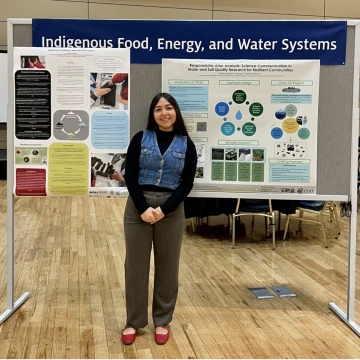
Nieves Vázquez (Graduate Research Assistant)~ This past academic year came with a lot of challenges to our livelihoods and passions, yet everyone at IRes persevered and focused on what we do best: strengthening existing community networks and providing resources to our communities and allies on- and off-campus. As a Graduate Assistant at IRes, I worked on research projects under Dr. Karletta Chief and Dr. Cherie De Vore, such as the “Covid-19 Exemplified Water Insecurities on the Navajo Nation”, “Geoscience Interpretation at Grand Canyon National Park” with associated Tribal Members, and “STAR School’s Culturally Relevant Pedagogy.” As a nominated Student Ambassador with the Native FEWS Alliance, my perspective informed the mentorship of students in Food, Energy, Water Systems. My cherished experiences this year are when we hosted community and cultural events, participated in off-campus gatherings with our Tribal partners, and simply ate delicious meals together. IRes fostered the confidence to present my research at numerous conferences at places like Duke University, Ak-Chin Indian Community, and in-front of my peers at the University of Arizona. I am thankful to all of the staff at IRes, our community members, and project partners for providing students like me an academic haven that helps maintain our cultural values so we may bring these experiences back to our communities. Tlaskamati miak, muchas gracias, thank you so much!
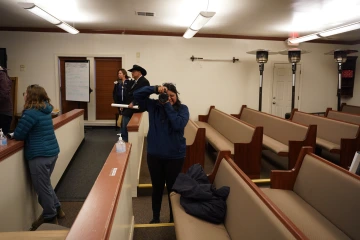
Trinity Norris (Marketing/Communications Graduate Assistant)~ Over the past year with the Indigenous Resilience Center, I’ve been incredibly fortunate to grow as a storyteller—one who gets to uplift the voices and work of individuals and communities deeply engaged in environmental justice. Through my role as the Marketing and Communications Graduate Assistant, I’ve had the opportunity to highlight the powerful stories of our communities and their relationships with land, water, and climate resilience.
Working with IRES has allowed me to help capture and share the wisdom that exists within our communities—wisdom that is often overlooked but so essential when it comes to conversations around the environment and climate justice. I’ve learned so much, not just from the work itself, but from the people I’ve had the honor of working alongside.
I’m especially grateful for the chance to help amplify these stories. Even in a year that came with its own set of challenges, what stood out most was the continued strength and persistence of tribal communities. Their resilience is both moving and motivating. Being part of a team that not only supports this work but centers Indigenous knowledge and leadership has truly been inspiring.
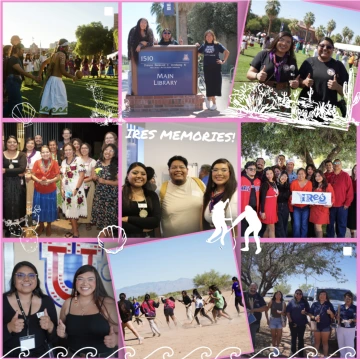
Winona Little Owl-Ignacio (Waverly Street Student Assistant)~ Over the past year, it has not been without its obstacles and systemic issues that were meant to continue to oppress us as Native people in higher education and further, doing the work for our communities. Despite this, our center has continued to persist and break through each barrier. As a graduate student on the Waverly Street Project within the center, we have not only been able to support the community work, but student community building by supporting student organizations such as Tohono O’odham Student Association (TOSA) and Indigicat Student Association (ISA). For Indigicats, supporting the work we do with Indigenous Peoples’ Day that had over 250 attendees this last year in 2024, with tribal nations represented from Tohono O’odham, Akimel O’odham, Pascua Yaqui, White Mountain Apache, Aztec, and the Three Affiliated Tribes of Mandan, Hidasta, and Arikara. For TOSA, being able to support us in having our first toka tournament, a traditional women’s game for the Tohono O’odham. Being able to not only create new relationships with the community but support our existing ones and give back to our people who have continued to support us throughout our academic journeys as students. These are just a few examples of the magic we have been able to share with the center, and I am so grateful for the support and backbone that IRES has given to not only us as student workers, but all the Native students at the UA. “Remember, they can’t stop you from smiling. And that’s what we do. We smile.” (Rez Dogs). Sapo.
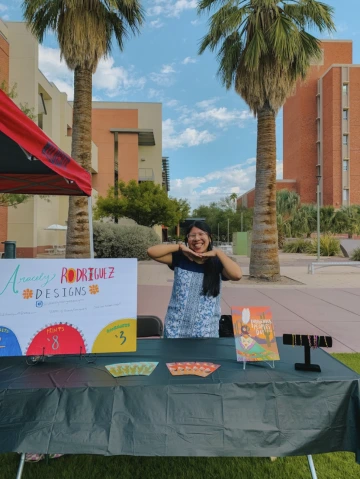
Aracely Rodriguez (Desk Assistant)~I’ve worked for IRES for a little over a year, and the Center has provided me with so many experiences and opportunities that I will never forget and forever be grateful for. As a Desk Assistant, it was incredibly exciting to get the chance to attend conferences, meet new people, and expand my design for work for the community. At the Center, it was always a pleasure to come in every morning and tackle a new challenge, and work with such an incredible group of human beings. Working at IRES has shown me that I can use my artistic passion and skills to serve greater causes and the community, and has opened my eyes to so many different areas of research and environmental work. While IRES has its core mission, vision, and values, I’d also like to comment that the root of all the work done here is love- love for the environment, love for the community, and love of knowledge. I am immensely grateful to the IRES Team for welcoming me with open arms- los quiero mucho!
Con amor,
Aracely Rodriguez
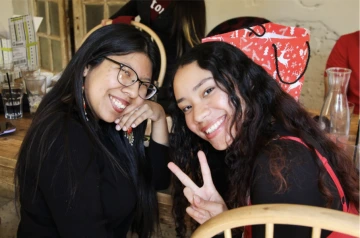
Nahe K.S. Nahoʻopiʻi (Desk Assistant)~ Iʻve been at the Indigenous Resilience Center (IRes) for a bit over a year, working alongside Aracely Rodriguez as the Centerʻs desk assistants. Through IRes, Iʻve been introduced to such substantial individuals and communities, with multiple learning experiences through conferences, attending community events, and more. IRes provides a space for enriched conversation, healing, and knowledge - in the cultural, climate, and individual sense. The core values of the Indigenous Resilience Center and its work have introduced me to an ever growing passion for environmental justice and protection, as I pursue such passion in my studies at the U of A. Some highlights during my first year include attending the Indigenous Data Sovereignty and Governance Forum held in Tucson, and establishing the IRes Library alongside Aracely Rodriguez, LaCher Pacheco, and Ruth Pannill~ housed within the Center!
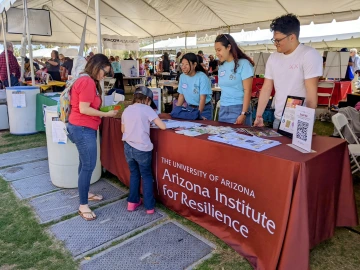
Miguel Corrales (Administrative Assistant)~ As I wrap up my second year at the Indigenous Resilience Center (IRes), I find myself reflecting on the invaluable opportunities I have had to grow both personally and professionally. Over the past year, I have attended events and taken on responsibilities that have strengthened my administrative assistant skills. From managing expense tracking to ensuring that our space remains clean and welcoming, I have embraced the importance of initiative and attention to detail in maintaining an environment that supports both the center's mission and the people within it.
Beyond its core values, IRes has been more than just a workplace—it has been a true community. The welcoming atmosphere has provided a space where individuals can connect, unwind, and focus on their academic pursuits off the clock. The sense of belonging that permeates the center is something I deeply appreciate, as it fosters meaningful relationships and a collective dedication to resilience. As I look ahead, I carry with me the lessons learned, the connections made, and a continued commitment to contributing to this inspiring environment.
